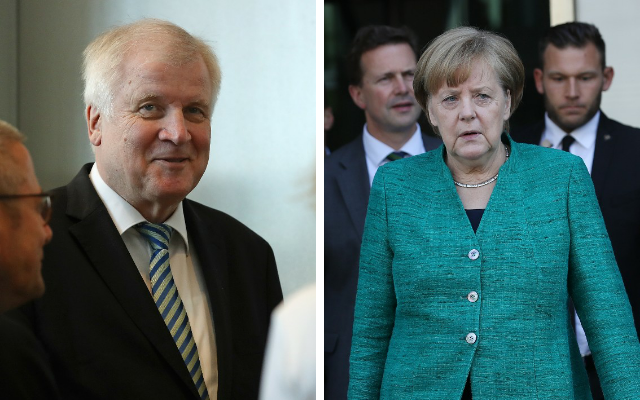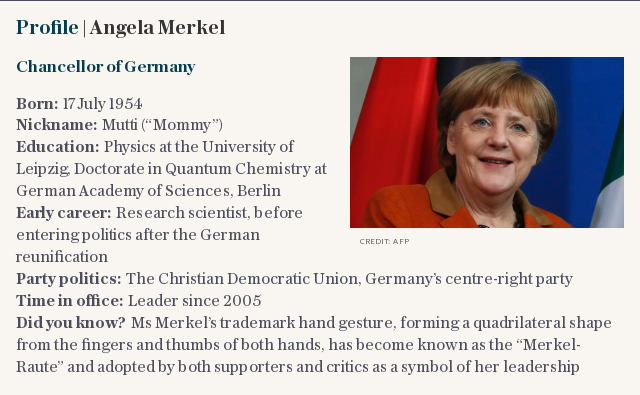Merkel, Seehofer and the battle of personalities that led to dangerous game of brinkmanship

The migrant issue has come back to bite Angela Mekel with a vengeance this weekend, as she faces last-ditch talks to save her government and a rift with a coalition partner over asylum policy that could bring about the end of her political career.
But the timing of this crisis has as much to do with a long-running and bitter personal rivalry at the heart of German politics as the fact that the numbers of migrants flocking towards Europe are rising again.
The dispute pits Mrs Merkel against Horst Seehofer, the interior minister who has long been her bete noir and the most outspoken domestic critic of her “open-door” refugee policy.
Mr Seehofer wants to turn away migrants at the German border, but Mrs Merkel has blocked the policy. A furious Mr Seehofer is threatening to impose it unilaterally as interior minister — daring Mrs Merkel to sack him or back him.

As leader of Mrs Merkel’s Bavarian sister party, the Christian Social Union (CSU), in theory Mr Seehofer should be her closest political ally. But no one who saw the undisguised rage on his face when the chancellor publicly rebuked him in parliament earlier this year doubts the intense personal rivalry between them.
Now it has erupted into a dangerous game of brinkmanship that could yet end the political careers of both.
The latest row seemed to come out of nowhere on Monday when Mr Seehofer abruptly cancelled a press conference scheduled for the next day to announce his new “masterplan” for migrant policy. It swiftly emerged that Mrs Merkel had blocked his plan to turn away migrants who are already registered in other European Union counties at the German border.
It was the only one of 63 proposals in the “masterplan” she objected to, but Mr Seehofer was not prepared to compromise. He told MPs at a CSU party meeting he would not release “half a plan with lazy compromises”.

Under the EU’s Dublin rules, asylum seekers can be sent back to the first member state they entered, but this currently only happens after they apply for asylum in Germany, a process Mr Seehofer says is too expensive and time-consuming.
Mrs Merkel says turning them away at the German border could wreck her attempts to negotiate an Europe-wide migrant policy at the next EU summit in two weeks.
In a bid to get the best deal, she's sticking to her guns. In a podcast released yesterday (SAT) Mrs Merkel insisted: "This is a European challenge that also needs a European solution. And I view this issue as decisive for keeping Europe together."
But to understand why the two leaders are ready to risk the entire government on this point, it is necessary to go back to the summer of 2015, when Mrs Merkel threw open Germany’s borders to migrants.
Mr Seehofer was opposed to the decision from the start, and repeatedly implored Mrs Merkel to close the borders. But she rebuffed him at every turn. In November 2015, he ambushed Mrs Merkel at the CSU party conference and publicly humiliated her by making her stand and listen as he lectured her like a recalcitrant schoolgirl.
The two patched up their differences and put on a united front for last year’s elections, and as his reward Mr Seehofer got control of migrant policy as interior minister. But it was clear the truce was over earlier this year when he used an interview to declare Islam “does not belong” in Germany within days of taking office.

It was Mrs Merkel who humiliated him this time, publicly slapping him down in her speech at the opening of parliament.
Mr Seehofer has had a tough start as interior minister. A corruption scandal over officials granting asylum applications in return fro bribes has emerged along with serious failings in the asylum system. While Mr Seehofer says he can’t be blamed for problems that date back to before he became minister, he has faced criticism for not getting on top of the problem.
Now at the moment he was planning to show he was in control with his migrant “masterplan”, Mrs Merkel has made him look impotent again.
But it’s not only personal: the CSU faces regional elections in Bavaria in October and Mr Seehofer is desperate not to lose the party’s absolute majority in the state, where the nationalist Alternative for Germany party (AfD) is polling strongly on an anti-migrant platform.
His political opponents have accused him of risking the country’s stability for the sake of a regional election.
“Mr Seehofer wants to campaign for the Bavarian elections in Berlin, and risks plunging Europe into crisis,” Filiz Polat of the opposition Green Party said.

“The economic and social achievements of the EU single market can’t be sacrificed at the altar of Bavaria,” Anke Rehlinger of Mrs Merkel’s main coalition partner, the Social Democrats (SPD) said.
Mrs Merkel won the support of her MPs at a CDU party meeting, and senior SPD figures have spoken out against Mr Seehofer’s plans. But the CSU has backed Mr Seehofer just as strongly, and if he is determined to make a stand on the issue there is little his coalition partners can do about it.
If he pulls the CSU out of the coalition, Mrs Merkel will have to find a new coalition partner or face new elections. With no guarantee her party will let her lead them into another election, it could be the end of her career.
But for Mr Seehofer the consequences would also be severe. It would almost certainly mean the end of the alliance with Mrs Merkel’s party, and a vengeful CDU would probably run candidates against the CSU in Bavaria and split the conservative vote.
With both Mrs Merkel and Mr Seehofer reportedly rejecting compromise offers from the other, Wolfgang Schäuble, the speaker of parliament and former finance minister, stepped in as mediator over the weekend in an attempt to find a solution.
But sources close to Mr Seehofer were briefing the German press his party was ready to reach for the “nuclear option”.

 Yahoo News
Yahoo News 
